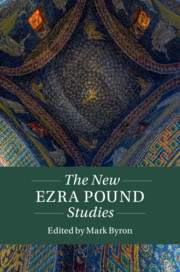Book contents
- The New Ezra Pound Studies
- Twenty-First-Century Critical Revisions
- The New Ezra Pound Studies
- Copyright page
- Contents
- Notes on Contributors
- Key to Abbreviations
- Editor’s Introduction
- Part I Pound’s Texts
- Part II Ezra Pound and Asia
- Part III Culture and Politics
- Chapter 11 The Transnational Turn
- Chapter 12 Pound, Gender, Sexuality
- Chapter 13 Italian Fascism
- Chapter 14 Late Cantos, ‘Aesopian Language’, States’ Rights and John Randolph of Roanoke
- Chapter 15 Copyright
- Chapter 16 The Temple and the Scaffolding
- Afterword
- Index
- References
Chapter 11 - The Transnational Turn
from Part III - Culture and Politics
Published online by Cambridge University Press: 17 October 2019
- The New Ezra Pound Studies
- Twenty-First-Century Critical Revisions
- The New Ezra Pound Studies
- Copyright page
- Contents
- Notes on Contributors
- Key to Abbreviations
- Editor’s Introduction
- Part I Pound’s Texts
- Part II Ezra Pound and Asia
- Part III Culture and Politics
- Chapter 11 The Transnational Turn
- Chapter 12 Pound, Gender, Sexuality
- Chapter 13 Italian Fascism
- Chapter 14 Late Cantos, ‘Aesopian Language’, States’ Rights and John Randolph of Roanoke
- Chapter 15 Copyright
- Chapter 16 The Temple and the Scaffolding
- Afterword
- Index
- References
Summary
The ‘transnational turn’ has cycled from its establishment within the social sciences in the 1990s, its dissemination across the humanities in the 2000s, to its reassessment in our present decade. It is the contention of this chapter that to reread Ezra Pound’s comparatist aesthetic and political labours within this presently contested framework demonstrates anew the significance of Pound’s methods of literary and cultural appraisal – and that this exercise can illuminate, too, the critical affordances and limitations of the transnational turn itself.
Keywords
- Type
- Chapter
- Information
- The New Ezra Pound Studies , pp. 181 - 195Publisher: Cambridge University PressPrint publication year: 2019
References
Works Cited
- 1
- Cited by



